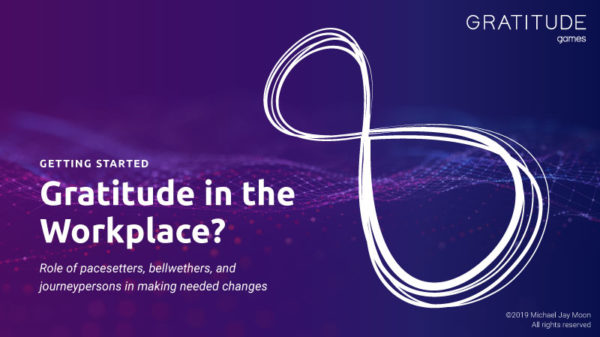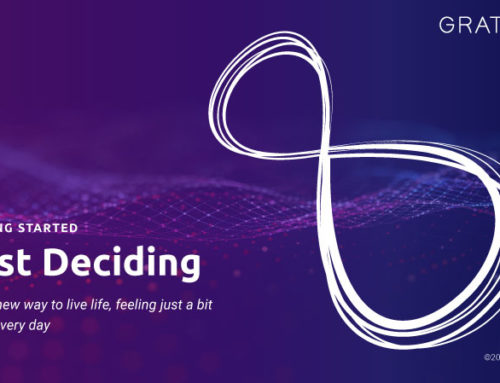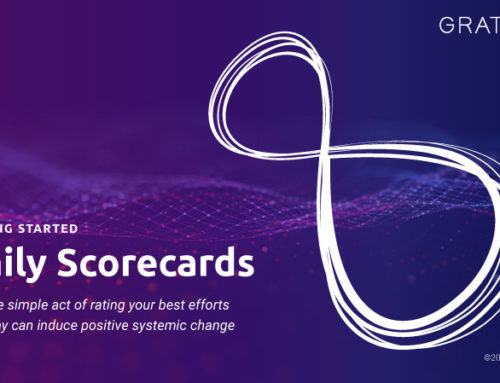It will not surprise you that Gratitude in the Workplace can start with one person: pacesetters, bellwethers, or journeypersons.
Let’s take a look at each with the aim of stepping into your role in the Gratitude Games.
Pacesetters
As their name suggests, they set the pace, often jumping out early, in front of a marathon or a new way of living, if only to goad the real winners to excel in achieving personal bests, taking the entire sport to the next level.
Pacesetters notice that something is amiss and become curious about why, about its root causes and possible solutions.
Pacesetters experiment with new patterns for how to live, work or play, using their direct experience to validate what works.
Pacesetters embody a new pattern for others to imitate, creating new games that others like playing.
Bellwethers
The term, bellwether, originally came from sheep herding. Even today shepards still find that a special ram that other sheep follow and put a bell around its neck, making it easier to manage a huge flock of sheep.
Bellwethers love leading groups, taking them to a better place.
Bellwethers lead through action, exuding an unspoken confidence that induces others to notice something novel, meaningful and predictive.
Bellwethers use vivid stories and metaphors to depict how to make a situation better and inspire others to join in making it happen.
Journeypersons
The term, journeyperson or journeyman, comes from the practice of trade guilds from medieval Europe, where a person would work in a guild under the supervision of guildmaster for three or so years.
In the Near and Middle East, some guilds also had inner circles in which apprentices and journeymen (as they were called then) would acquire secret knowledge, usually of a spiritual nature.
Journeypersons have made the personal commitment to master a body of knowledge, setting forth on a journey of self-discovery, transformation, and mastery.
Some might call a journeyperson an aspiring master, an iconoclast or gamechanger.
Journeypersons deepen their knowledge through deliberate practice with something that today we call social learning.
They mentor others seeking to enter the craft and become proficient.
In the process, they learn how others learn, adding depth and nuance to the working knowledge of the journeyperson.
Mentoring forces the mentor to articulate and begin systematizing what they know, making it more accessible and inclusive.
However, mentoring produces something even more powerful: a commitment contract.
Mentoring creates a powerful inducement to follow your own advice … which you imparted as a mentor and must now embody, or become a fraud and hypocrite.
Journeypersons who mentors invest in building a stack of good habits, learning how to build and reinforce small habits every day and parlay them into an unstoppable force of surging momentum.
In my particular case, I have played all three roles across my professional career as well as more recently in developing Gratitude Games.
However, I came to that point of the journey where I could not just journey and learn for the thrill and adventure of learning that one more thing.
I just had to stop dithering about when to start workshopping the protocols and putting what I have learned to so into the hands of people who want to play.
So, here we go.
Let the Games Begin
As the self-appointed gamemaster, akin a guild master, I am the organizer and moderator of our cooperative, open-ended games of Gratitude.
But here’s a novel twist: the true nature of Gratitude Games has yet to reveal itself.
Only by playing will Gratitude Games disclose itself. And I can’t wait to see what it will become!
It’s up to each of each of us to determine how will play out.
Whether you decide to jump in as a pacesetter, bellwether, or journeyperson (or even as an aspiring master), I will remain focused on creating tools, protocols, and user guides for use by anyone who wants them.
So help me, help you to learn how to play Gratitude Games.
Learning How to Learn
I am a huge advocate of just starting with something that’s simple, immediately gratifying, and interruptible.
Simple means not having a lot of prep work or lots of prior knowledge. Simple converts into nothing to it but to do it.
Gratifying means that the first or second time you do it, you feel it. It’s not like “good for you” vitamins that may take months or years to notice any beneficial effect.
It’s more like Guarana Energizers caffeine tablets. And, it’s something sufficiently pleasant and useful that you’d look forward to doing it again tomorrow.
Interruptible means that until you make it a habit, you can stop and start again with little or no negative effects.
This of course reinforces the other two criteria: simplicity and instant gratification.
One more thing
Gratitude Games are circular. They do not have an official starting place.
So just jump in. It does not matter where you start.
And here are four places can start
Daily Scorecard: Simple rating on a 1 – 10 scale of your “having done your best today” on seven or more foundational skills of Gratitude.
Placemat Intentions: Simple two-minute set of inscriptions or say-it-out-loud intentions for cueing your Cognitive Unconscious to put you into a flow state or invincible enthusiasm.
Evening Journal of Gratitudes: Written in bed just before you turn out the lights, you express your gratitude for five or more interactions or experience that occurred during the day.
Strollitations: Spoken aloud statement of intention to receive inspiration or guidance while taking a walk and ways of experiencing things you encounter along the way




